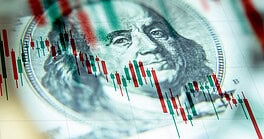
Swaps and other derivatives, blamed by some for causing the global financial crisis, have returned in a big but deceptive way. The Bank for International Settlements reports that the notional amount of over-the-counter (OTC) derivatives outstanding totaled $483 trillion at the end of last year—creeping up on the pre-crisis high of $672 trillion. And US taxpayers could be on the hook for another bailout if the banks’ bets go bad.
While Dodd-Frank restrictions have taken some risk out of OTC derivatives, bankers are using a loophole in the law to escape stringent US regulation for more lax jurisdictions by booking swaps—derivatives contract whereby two parties exchange financial instruments and cash flows—in Europe. The banks lobbied aggressively for various loopholes while Dodd-Frank was being crafted and subsequently, 2010-2013, while the Commodity Futures Trading Commission (CFTC), which regulates most derivatives, was crafting regulations to implement the law.
“It is easy for banks to evade the law using the extraterritorial provision found in guidance provided by the CFTC,” says Michael Greenberger, professor at the University of Maryland law school. This cross-border provision is spelled out in footnote 563 (of 662) in the agency’s July 26, 2013, policy statement. By trading through a foreign subsidiary, and not providing a guarantee, a bank can evade Dodd-Frank.
Still, notes Greenberger, a former director of the division of trading and markets at the CFTC who testified before the Financial Crisis Inquiry Commission on the role of derivatives in the crisis, “the ultimate risk remains in the US, where taxpayers could once again be left holding the bag in a crisis.” The main swap banks would need to be bailed out, he says. Four large banks (JPMorgan, Citi, Goldman Sachs and Bank of America) account for more than 89% of the derivatives activity of US banks, according to the comptroller of the currency, and, Greenberger adds, as “too big to fail” institutions would probably need to be bailed out.
The CFTC tried again to close the swaps loophole this past December but failed to get the job done before the Trump administration took office. Now, House Republicans are looking to gut much of Dodd-Frank.
Naked credit default swaps encouraged widespread betting on the subprime mortgage market by providing a method to short the market without any exposure to its risks. For a relatively small premium, speculators could bet that those who could not afford mortgages would not pay them off. These “side bets” meant that on average a single mortgage outstanding had nine bets on it to fail, Greenberger says, substantially enlarging the notional market. However, the underwriters of the swaps did not have adequate capital to pay off guarantees as housing prices slumped.
The risk is that derivatives could be used to bet against the repayment of student loans or auto loans, or anything else that seems like a good bet, Greenberger says. US household debt has topped the 2008 peak of $12.7 trillion, according to the Federal Reserve Bank of New York. High student loan debt and delinquencies could be a sign of future problems.



